Re-Defining Motherhood and Advocating for Parent Artists
Just under a year ago, I attended a Women in Theatre forum in Chicago. I had gone with the intention of hosting a breakout session for them on "Motherhood in Theatre," hoping to find some like-minded artists at the forum. On the sign up sheet set up for my session, there were only two names—but beneath, someone had drawn an arrow through the many empty spaces and written, "This is why we need this." The opportunity to curate a series for HowlRound comes a month shy of the one-year anniversary of that sign up, and nothing could be more true than the message in that note. In the fight for diversity, equity, and inclusion, creating platforms that give voice to the nuanced experience of all parents will identify how the theatre culture at large can act to make better pathways back in for those left out of the discussion, thus directly affecting the pipeline, content, and population of our craft. The motherhood session we hosted was attended by fifteen mothers in Chicago and was the preliminary meeting of Parent Artist Advocacy League for the Performing Arts (PAAL), a national resource hub and all-parent, all-discipline league advocating for a national standard of best practices for parents in the performing arts. This HowlRound series builds on the work of PAAL and will cover challenges faced by parent artists and offer some solutions and advice.—Rachel Spencer Hewitt, series curator
He silenced me. I had been telling him of my successes, and yet: “I wouldn’t share that, if I were you.” He hushed, hands in pockets. His comment, I would later learn, belonged to a legacy of silence: “There goes your career,” she told her at an industry party. They wouldn’t schedule interviews for work—because they didn’t know “what could happen” if she were pregnant. “Children aren’t allowed in the apartments,” so they found someone else. “Don’t tell anyone” was the advice she received from her union. “If you choose to have children, you take the consequences” the first commenter and theatre contributor wrote. “She took the maternity leave, but while she was gone, the resentment was evident,” she recalled.
In these moments, in the performing arts industry across the country, mothers are being silenced. Mothers are getting fired. Mothers are afraid. Mothers are falling away. Mothers and fathers are leaving the arts to make equitable partnership possible. Parents, caregivers—those who have the audacity or obligation to care for someone else—are cut off from the theatre due to archaic structures and inflexibility. The artists among us who expand their lifestyle to include caring for others are searching for community support. Many feel isolated, professionally disempowered, unheard, and, in almost all cases, drowning in the undertow of financial demands beyond the artist’s usual and persistent challenges. The tasks required become impossible when combined with inflexibility of structure, invisibility of support, and unpredictability of work culture. This potent cocktail of disenfranchisement can force unnatural splits in artists’ career trajectories, driving competent, diverse groups of theatre professionals away from the profession. We are losing artists.
In the performing arts industry across the country, mothers are being silenced. Mothers are getting fired. Mothers are afraid. Mothers are falling away. …Parents, caregivers…are cut off from the theatre due to archaic structures and inflexibility.
My own experience of being silenced left me speechless—for only a moment. The time I was advised, with the best of intentions, not to share my story was a turning point for me, pinpointing my individual artistic pursuit and expanding it into the context of a larger community. The exchange between this fellow actor and myself lasted mere minutes but profoundly revealed gaping holes in the theatre culture’s general approach, expectation, and treatment of parents in the industry. His advice to speak less was supposedly for my own good: staying private about parenthood and career—both its successes and struggles—prevents an artist from being defined by them to the institutions and prevents other artists from comparing struggles or successes between one another. So the theory often goes. The supposed result is head-down stasis, no disruption. Getting the job done while parenthood stays in its designated lane of private life. I had already experienced a hint of both doubt and support from those with power, so the reality that motherhood in the theatre is met with different opinions was not new to me. Long story short, I quickly realized that the silencing meant to keep us safe actually succeeded only in making us docile, defeated, discriminated against, and divided. This toxic, so-called “protection” needed to be dismantled, and that necessitated breaking the silence wide open—starting with my own.
A Global Conversation
Within the same year of my silencing, I began publishing a blog of all the journal entries I had been recording privately about how my pregnancy and motherhood informed my work and artistry. The site Auditioning Mom was born (and continues to turn out drafts from early in my experience and interviews with other parents). Around this time, I also stumbled across an article by Tara Derrington of MAM Ireland—the Mothers Artist Makers born out of the Waking the Feminist movement—articulating that mothers who fight for progressive change in the theatre are not “sour grapes” wallowing in career disappointment, but actually great lovers of the craft, forging pathways back in. Love for the work is, indeed, the source of motivation. PIPA UK had flown onto my radar around this time as well. I studied and interviewed their founders about the swift growth from respected consortium to influential organization with data collection and solution implementation.
Meanwhile, the work I composed on my own platform expanded beyond my own stories. I knew that if I were to represent the motherhood experience accurately, I needed to develop a diverse range within the category itself. I introduced the series What She Looks Like, an ever-growing collection of interviews consisting of mothers in every discipline at different phases of their career. I also began collecting stories of parent obstacles and solutions to raise awareness of what stands in the way of success and what can be done in terms of support systems that some organizations have already successfully put into place for parents. The discovery of motherhood/parenthood in theatre as a topic of inclusion was a global conversation. Engaging with it on this scale elevated for me the urgency of organizing significant change in the US.
Breaking the Silence
In Chicago earlier this year, I led the first Motherhood in Theatre forum as a breakaway session for the Women in Theatre forum. I learned quickly that breaking the silence on my own experiences instantly attracted stories from other parent artists. The Motherhood session and meetup provided invaluable insight into the working lives of mothers in the theatre community. Numerous parents, predominantly mothers, expressed a desire to collaborate, including researcher Ineke Ceder from Wellesley Centers for Women—one of the contributors to the instrumental 2016 study on women leaders in Resident Theatres. Her study published steps on how an organization can better support work-life balance. In connecting with Ceder and reading the Wellesley study’s discoveries, I found my own inciting incident echoed in the pages of obstacles contributing to gender inequity in theatre leadership. Chapter nine of the study articulates that the topic of motherhood was not mentioned initially as a significant obstacle to pursuing a leadership role in the theatre, but additional investigation revealed that the obstacle was very real but well-hidden: “These further consultations led us to conclude that a silence surrounds the topic of family responsibilities in the theatre world.” In reading this discovery, I realized “breaking the silence” could not simply stay a personal goal. It needed to become a national objective because it directly affects our leadership pipeline. PAAL is now working with Ceder to pursue the necessary data for innovation through further research on obstacles and solutions that will focus on mother and caregiver theatre artists and leaders potentially left off the grid of consideration.
Following the Chicago forum, I sent out a call that anyone interested could contact me. Hoping at first to hear a willingness for representation from a few nearby cities, I began receiving interest from all over the country. I heard from Jill Harrison of Director’s Gathering in Philadelphia that she was passionate about bringing this conversation to her city. We scheduled calls to craft goals, set our mission statement, and establish sustaining structure. Jill and I connected with Philadelphia Women’s Theatre Festival who co-hosted the Philadelphia event and now, post-forum, are dedicating their entire 2018 season to Motherhood in Theatre. Lydia Milman Schmidt, the Chief representative in Chicago for PAAL, leads a group called Parents in Chicago Theatre and offered a survey she conducted with parents in Chicago to serve as initial data gathering for our published pieces. Laurice Grae-Hauck of New Jersey Theater Alliance coordinated the logistics in New Jersey, gathering some of the most experienced theatre professionals and mothers to share their stories, wisdom, and jump on board for supporting PAAL’s national efforts. Jenna Woods—administrator of a private online community with almost 1,000 mother theatre artists in just over a year—worked the ground level in Manhattan, securing meetup space in the respected Manhattan Theater Club, just down the street from where Broadway Babysitters provided childcare for the mothers attending the forum. As a result of this organized effort, we hosted forums in Philadelphia, Montclair (New Jersey), and New York City within a mere four months after the first phone call—and, all in a single weekend, officially launched our national network: Parent Artist Advocacy League for the Performing Arts. A contributor at the Clyde Fitch Report, Devra Thomas, reached out to cover the event—in large part due to her own similar experiences as a mother and theatre professional.
Now, in just six months from our official launch, we have hosted forums in five major theatre hubs, including Chicago, New York, New Jersey, Philadelphia, and Boston—organized three social community meetups in Chicago, begun a free workshop series for mothers pursuing their passion with Actor and Coach Jazelle Morriss, and expanded our forums to specific career mentorship and dialogue, featuring guest panelists that include health professionals for post-partum care and career. With over forty reps in ten major cities, and growing, our presence and resources development promise to continue expanding at a rapid pace.
How It Works
Parent Artist Advocacy League (PAAL) is a national organization committed to empowering local efforts and the needs unique to local theatre communities while advocating for a national standard of consistent best practices. The three main action tenants are organize, network, create. PAAL functions as a national resource hub, solutions generator, and advocacy group. Structurally, the PAAL steering committee guides the national conversation and prioritizes projects. Chief representatives in each city communicate the national objectives to the PAAL community locally while informing the national conversation on local developments. Collaborating with the chief representative, communities in each city are made up of contributing representatives (reps) who help host conversations, social meetups, identify obstacles, and promote and create local solutions. Any parent-artist interested in contributing to PAAL’s project efforts or hosting forums in their city can contact us at any time.
In addition to functioning as a national resource hub and mediator for parent artists and institutions, PAAL has outlined a five-year plan to develop support and create accessible pathways. PAAL as an organization is all-parent, all-discipline inclusive, but the first year is dedicated to mothers and the gender-specific obstacles they face, beginning with breaking the silence. Year two will focus on collecting, creating, and implementing Initiatives and Solutions, both for parent artists and institutions, while continuing to publish recommendations for behavior and treatment for inclusive and progressive work culture; research must be pursued in earnest to prioritize initiatives based on data. The third year will focus on Policy and Protocol, creating educational resources on legal rights, officially mediating the protections and writing constitutional practices that will establish a national standard for supporting the parent artist in collaboration with the unions and employment institutions. The fourth year goal is to have received the funding to continue these efforts while helping artists secure residencies and provide grants and scholarships for amenities such as childcare, studio space, extended workshop opportunities, and more. The large project goal for year five is to provide the first PAAL Grant, a large award to an artist in the performing arts who parents a child with special needs. The grant will provide specialized childcare, space for project creation, apprenticeship, mentorship, and showcase opportunity for the parent-artist’s created work in their specific discipline for an extended amount of time.
What We’ve Made Already
In addition to scheduling the forums, community meetups, and workshop opportunities, PAAL has also been publishing protocol recommendations that can help create standards for work environments and individual interactions such as How to Talk to a Pregnant Person, pieces on motherhood as content, arguments for solutions to isolation and discrimination, and more on our official blog. Thanks to our PAAL Contribution Rep and founder of IFCAP Catherine Mueller Melwani, we have begun to tackle concepts of visibility, identity, the right to parental leave and taking time away, creating pathways back in, illegal interviewing and firing practices, workplace discrimination, and childcare resources. We promote parent-artists’ work and initiatives as well as post job openings and casting notices for parent-specific opportunities on our social media page, like The Bumps—a play that features three pregnant women and developed rehearsal practices that benefited both the production and the performers. We have begun collaborating to create resources for the Parent Committee of Actors’ Equity Association as part of Equity 2020, gathered interest for a Motherhood Reading and Monologue Series in multiple cities, and collected over one hundred contributions for a Pregnancy Handbook for Actors and Stage Managers. The handbook series is designed to expand to postpartum handbooks as well and cover all disciplines. These initiatives are developing at an incredible rate—all this in only six months and all due to the passion, genius, and commitment of parent artists.
Motherhood specifically must be redefined and represented in order to successfully improve gender equity in the theatre: motherhood is a valid lifestyle, quality of leadership, and creative asset for theatre contributors.
Access Needs and The Benefit of Inclusion
In terms of creating a family-friendly environment, there are tangible next steps every institution can take, whether it is two-person owned or two million endowed. PAAL has provided an action-plan in this HowlRound parent-artist series for creating a family-friendly work environment. There are no financial excuses. Even the most basic changes can begin today. After attending the TCG gender equity think-tank and the profound Berkshire Leadership Summit, I experienced wide-spread support and witnessed confirmation that motherhood specifically must be redefined and represented in order to successfully improve gender equity in the theatre: motherhood is a valid lifestyle, quality of leadership, and creative asset for theatre contributors.
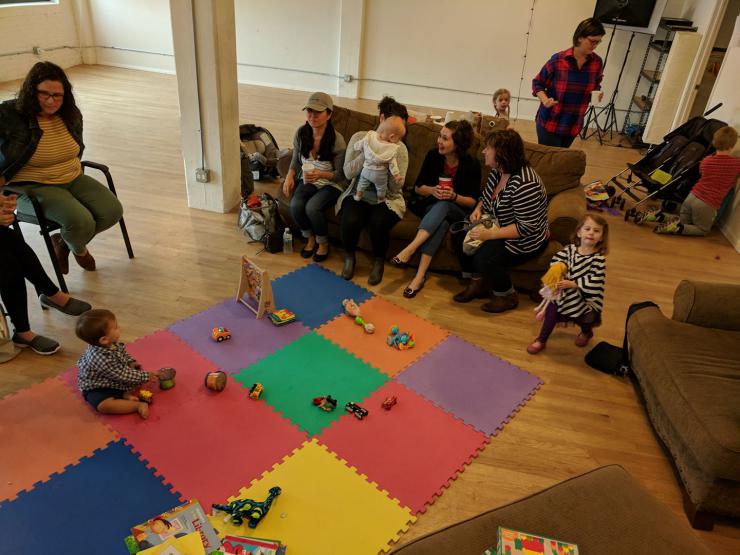
Like our sister organizations overseas, this work all stems from a deep love for the performing arts and the desire to make and create alongside our colleagues. We assume good intentions from institutions while we offer to help facilitate building these bridges between employer and artist. The initiatives developed and still developing provide benefits to every productive collaborator, parent or not, administrative and creative. The suggestion to release rehearsal schedules ahead of time, for example, benefits every production team because it allows for the best preparation and flexible investment of time for work-life balance and synchronization of diverse lifestyles—while leaving room for necessary last-minute adjustments but encouraging their use only as exceptions. We must be willing to part with the systems we use that no longer sustain. We must be willing to break the structures to support the people, not break the people to preserve the archaic structures. We must continue to think of inclusion in terms of access needs—caregivers are no exception to this concept—and remember that true inclusion creates the healthiest work environment for everyone.
Leaders Who Ask Questions
The majority of parents or those even considering the lifestyle will have at least one event of artistic introspection that questions their career trajectory: “Is this track possible? Do I still want this?” For many, this question can conjure feelings of failure, fear, or shame. The lack of administrators willing to initiate the conversation about caregivers’ needs and assist with parent-led transitions leads to unpredictability of consequences, reduced communication of expectations, and severe deficit of healthy, open mentor relationships, potentially preventing temporary part-time transitory periods that could assist with upward employment down the line. Sound leaders and institutions will see this question not as the wavering of commitment or capability, but as a rite of passage for the maturing artist—both as a maker and leader. We must embrace this questioning as wholly artistic and highly necessary in a leader’s career trajectory: it is the essential moment of evolution. It actually readies and better-qualifies the artist for the path to leadership.
Parent artists are those who peer into the darkness shrouding future aspirations and question the viability of every step leading into the void of career objectives. This terrifying exercise is not a sign of the weak, but a turning point of the qualified. Every nonprofit must confront the ultimate question multiple times in its own lifecycle: is this a change or the end? What if theatres promoted leaders like the parent artists who have experience asking this very question in a personal context who can then translate the skill of regeneration directly to institutional growth: “What is our vision now that we’ve grown, and what direction should we grow to fulfill our renewed vision?” and the question embodied by the caregiver: “How are we caring for our community while simultaneously pursuing our unique mission?” If we hired leaders experienced with these identity-challenging questions, perhaps we’d see more institutional visions align with relevant culture, fewer millennials remain a mystery target group, and content-stagnation replaced with resurgence of something new and viable. A parent artist who pursues a promotional track after wrestling with questions of purpose is not an artist of divided commitment, but an expanded artist who intimately engages with the necessary reality of re-evolution and revolution. They are leaders ready to confront dying visions and find renewal in the landscape of limited resources. They are the leaders our theatres need now.

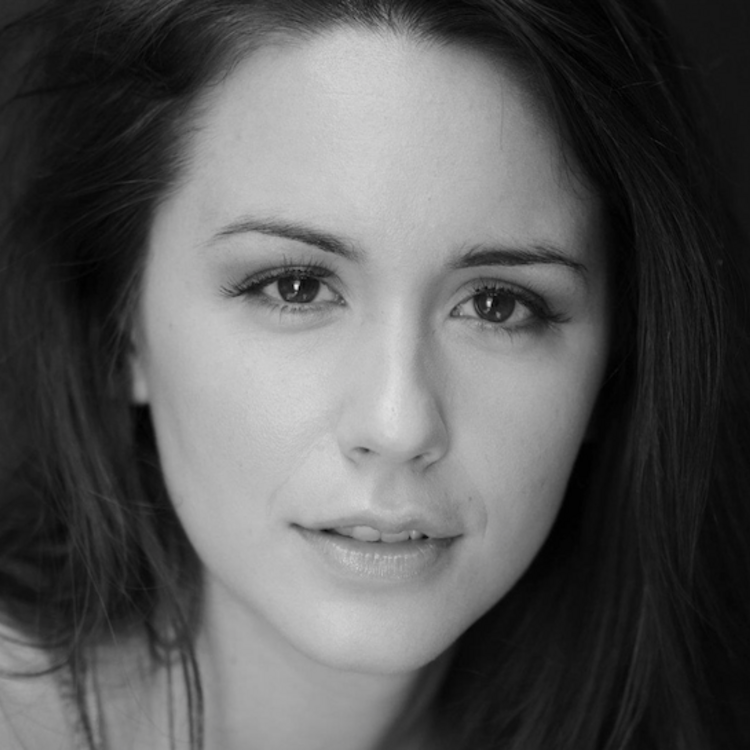
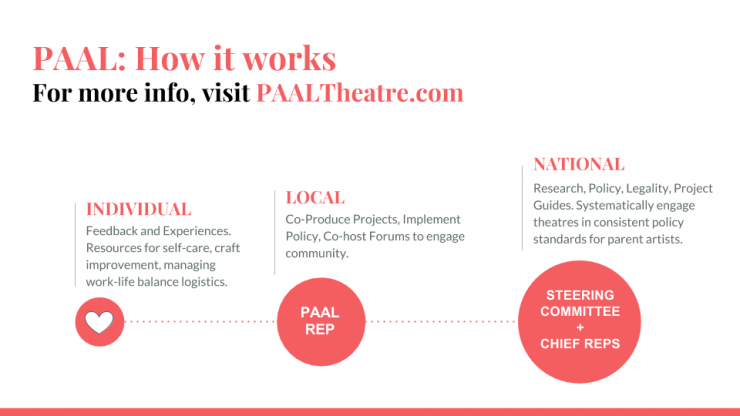
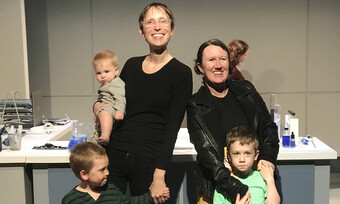

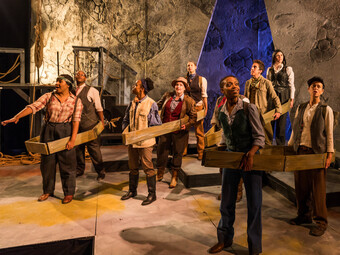

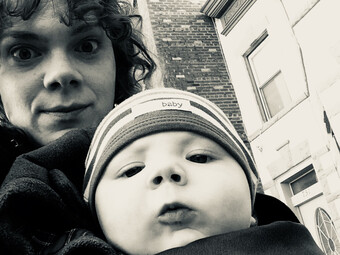

Comments
The article is just the start of the conversation—we want to know what you think about this subject, too! HowlRound is a space for knowledge-sharing, and we welcome spirited, thoughtful, and on-topic dialogue. Find our full comments policy here
I am happy about these initiatives and/but hoping for others to address solo parents. As a solo actor and playwright parent (a widow) I have felt sort of devastated to not find *any* fellow travelers in the world of performers who are solo parenting. I have not moved to New York for instance because I do not see how it could work. I am also deeply concerned that many solo parents do not even see it as a possibility to participate at all much less make a career in the arts. The logistical and financial hurdles are too great. What can we do to survey and support this subpopulation who has so much to add to the conversation and content in the performing arts (and politics for that matter). This ties in, too, I believe to the holy grail of expanding and increasing audience diversity in the performing arts. This has to change but we need advocates and support from the non-solo parenting world. How can we address this?
Jennifer, this is an absolutely vital conversation. At our first meeting we had mothers share on single motherhood. While we have just begun to collect stories, we are intent on including this narrative and hope that all the resources we develop are helpful for solo parents as well as create a channel of access for them to have their needs met specifically and space to create. I'd love to connect with you and hear your story. I also have a connection to other single parents and would love to help connect you as a community. Thank you for this. I am in full support and look forward to learning how we can make making art more possible for solo parents.
Thanks for writing. You can reach me at [email protected]!
Thank you! We will be connecting with you this weekend. More soon.
So many women have approached me in recent years to talk about this subject. They want to know how I made a life in the theater for so long whilst having kids. It wasn't easy, and I give much of the credit to my halo-around-his-head husband who understood how important my work was and covered me for years when I was working the "second shift." (The first shift is the 10am-6pm office hours and then the second shift from 6:00-8:30pm is dinner with donors and greeting at the theater.) This issue impacts not only artists working in the field, but all the parents who work in supporting roles be it production, marketing, fundraising etc. I was also lucky to have spent so much of my career at a theater organization that was truly forward-thinking in the life/work balance business. Thank you PAAL for taking this on and giving it the attention it deserves!
Jill, so grateful you were at an understanding institution and received the support you needed. Those resources are crucial. I could not agree more that these factors affect on and off stage, creative and admin, full and part-time - and every participant making theatre possible. Such an important reality to acknowledge and recognize the support needed for many hands. We hope our resources are well-implemented and address all levels of employment across discipline and contribution so that work culture and practice is altered for the better holistically. Great connecting with you on here - and thank you for continuing to make and guide those who came to you.
What an inspiring and incredibly well thought out initiative. To have 40 reps, 5 cities and a 5 year plan already is incredible! PAAL is a real testament to the value, need and momentum of these important efforts. The time is clearly now. It is also clear PAAL will have far-reaching impact on the leadership pipeline. Go Rachel and her team!
Thank you so much, Kristen! Opportunities like the Berkshire Leadership Summit are crucial to make inclusion initiatives possible and making space for like minds to find each other, get necessary training, and forge paths. So grateful to be connecting with so many trailblazers in this moment in time.